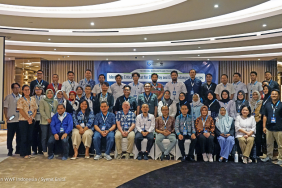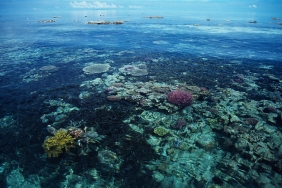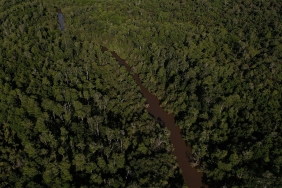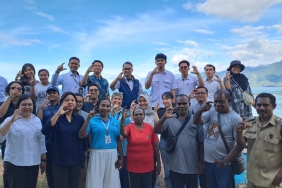ENVIRONMENTAL PRESERVATION IS AN IMPORTANT CONSIDERATION FOR MILLENNIALS AND GEN Z TO MAKE PRESIDENTIAL CHOICES IN 2024 ELECTIONS
WWF-Indonesia Survey Results on Millennial-Gen Z Perceptions Across Indonesia on Environmental Preservation in the Vision and Mission of Each Presidential Candidate in the 2024 Election
Jakarta, January 19, 2024. The issue of environmental conservation is one of the important priorities for millennials and Gen Z in choosing presidential and vice presidential candidates in the 2024 elections. Therefore, it is necessary to understand their views regarding environmental conservation policy plans for presidential and vice presidential candidates. To find out about this, WWF-Indonesia Foundation surveyed millennials and Gen Z throughout Indonesia, the purpose of this survey is to gain a deep understanding of the support and choices of millennials and Gen Z regarding the vision, policies, and commitments of presidential and vice presidential candidates that reflect their preferences and needs in the context of environmental conservation. The survey was structured with three main dimensions, namely opinion or assessment of candidate pairs, voting behavior, environmental vision, and environmental conservation mission.
The survey was conducted in early December 2023, with a total of 1365 millennial and Gen Z respondents with an age range of 17-30 years who live in several major cities, such as Jakarta, Bandung, Semarang, Jogjakarta, Surabaya, Bali, Medan, Jambi, Samarinda, Makassar, and Jayapura. The profile of the respondents is 63 percent female and the rest are male, with socio-economic status of middle to upper class with the majority of minimum education from high school to college, the majority of occupations are private employees and students.
Survey Results on the Biggest Environmental Issues and Impacts on Environmental Damage
The survey found that there are five major environmental issues that millennials and Gen Z think should be addressed immediately by future presidential and vice presidential candidates. The majority said garbage and plastic waste must be addressed immediately (81%), the second most are concerned about clean water supply and green city development (69%), limiting industrial pollution (66%) and finally protecting biodiversity, flora and fauna (58%). This proves that although the majority of respondents are urban, they still consider biodiversity conservation important.
72% said they were affected by garbage and waste, experienced shortness of breath due to air quality degradation (68%), felt water quality degradation (53%), and 43% felt damage to forest or marine ecosystems.
Environment-Related Presidential Candidates' Missions and Agreed Vote
Presidential candidates' mission statements are of interest to young people, but some still do not understand what they mean. From the survey results, 72% have partially studied the vision and mission of each candidate, 22% have not studied at all, and the remaining 6% have fully studied. When asked further why they had not studied them, 44% said they did not know the right source of information, 27% had no time and 15% said information was not easily accessible. Further developing the results of this question, the result was that 75% of respondents claimed to find environmental protection in the candidate's vision and mission, but almost 40% said the vision and mission were not easy to understand.
Survey results show in general that 82% of respondents said they would vote for presidential and vice-presidential candidates according to their vision and mission rather than the lure of prizes offered by candidates. This is something that needs to be underlined young people are not easily promised gifts to ask for their support. Also, 88% agree to vote for a candidate who prioritizes and resolves environmental issues. As many as 78% of respondents stated that they would vote for candidates who have the background, track record, and experience in managing the environment.
Aditya Bayunanda, CEO of WWF-Indonesia Foundation said, "We are happy to see the results of this survey which says that 97% of young people will consider voting for candidates who support environmental conservation, and that means environmental issues are a concern for young people. As many as 75% claimed to know the environment in the vision and mission of the candidates but as many as 36% did not understand its meaning, so this is a good opportunity for the candidates to better explain their vision, mission, and work programs, especially those related to environmental conservation and also develop concrete programs."
A total of 86% of respondents want to choose a presidential candidate who can solve environmental problems and disasters. For example, restoring marine and forest ecosystems, tackling garbage and plastic waste, and having a strong disaster mitigation program.
What They Think about Waste and Carbon Emissions
What about natural resource and waste management? The result is that the majority (93%) of respondents will choose presidential and vice presidential candidates who can overcome the reduction of plastic waste, 89% of clean water procurement such as the construction of WWTPs, river cleaning, clean water distribution, and 84% choose presidential and vice presidential candidates who can encourage the acceleration of the implementation of new renewable energy such as wind, sunlight, geothermal and others.
The majority of respondents understood about carbon emissions, as evidenced by 92% agreeing to vote for candidates who have programs to reduce carbon emissions, limit industrial pollution followed by green cities, green industries, and maximize green open spaces (91%). But inversely, accelerating the implementation of electric vehicles to reduce carbon emissions received a low answer (73%), meaning that there is no correlation between reducing carbon emissions and the use of electric vehicles.
How Information is Exposed
The survey results also show where millennials and Gen Z get their information from. The result is not surprising, still, social media reached a high number (73%), this is good data for candidates to communicate the vision and mission of the environment through social media. The second data is that online media (56%) is still accessed to get information 51% from YouTube, and 47% from television. However, the most effective are social media (41%), television (14%) and YouTube (13%), face-to-face only 12%, and online news media only 5%.
The WWF Indonesia Foundation encourages these candidates in the remaining debates and campaigns to communicate programs and later commitments to save the environment with a communication style or way of communicating millennials and gen Z, more intensive, incessant, and easy to understand through social media and more use of visuals. And if elected, promise to carry out the vision and mission of the environment properly.
Finished
For further details, please contact:
Karina Lestiarsi, Communication Officer WWF-Indonesia
klestiarsi@wwf.id / +62 852-1816-1683
About WWF-Indonesia
WWF-Indonesia is a civil society organization with a local entity and global network, supported by more than 100,000 supporters. Our mission is to stop the degradation of the earth's natural environment and to build a future in which humans live in harmony with nature, by conserving the world's biological diversity, ensuring that the use of natural resources is sustainable, and promoting the reduction of pollution and wasteful consumption.
For the latest news, visit www.wwf.id and follows us on X @WWF_id | Instagram @wwf_id |Facebook page WWF-Indonesia |Youtube WWF-Indonesia
About Populix
Populix is a go-to data and insights service that connects businesses, institutions, and individuals with qualified, diverse, and targeted respondents across Indonesia. From market and social research to quick surveys, lead generation, and brand activation. Populix leverages the power of technology to simplify comprehensive data collection. We provide beyond leads, but also valuable insights and in-depth analysis to assist clients and partners in making more informed decisions and actionable plans.





